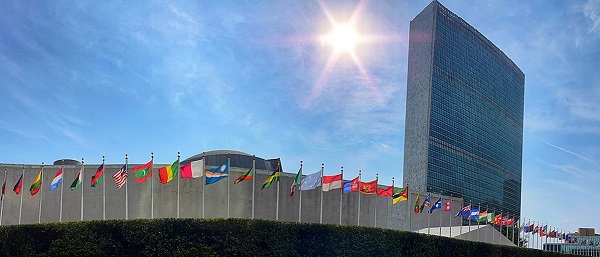Business
Trump’s steel tariffs will hit BC hard

From Resource Works
BC is a huge source of mettalurgical coal, which is used to make steel.
US President Donald Trump’s announcement of 25 percent tariffs on imported steel will send shockwaves through many industries but one of the hardest hit will be British Columbia’s coal industry. As the largest exporter of metallurgical coal in Canada, B.C. relies heavily on global steel production and these tariffs will reduce demand, destabilize prices and disrupt supply chains.
Unlike thermal coal used to generate electricity, over 95 percent of coal mined in British Columbia is metallurgical coal or coking coal. This coal is used to produce coke, a carbon rich fuel used to remove oxygen from iron ore in blast furnaces. Steel production is a big part of global industrial activity and B.C.’s coal industry exists because of that demand.
According to provincial data coal is B.C.’s most valuable mined commodity, generating billions of dollars in revenue each year. B.C. coal is exported mainly to Asian markets like Japan, China, South Korea and India but the US steel industry has been a customer too. A reduction in US steel production due to tariffs could disrupt global steel trade flows and reduce demand for metallurgical coal from B.C. miners.
Trump’s latest 25 percent tariffs on all steel imports is a repeat of what happened in 2018 when similar tariffs were introduced. At that time the tariffs increased costs for US manufacturers and led to retaliatory tariffs from Canada and other trade partners. The economic impact was big – Canadian steel and aluminum producers lost business and retaliatory tariffs were imposed on a range of American goods. The 2018 tariffs also didn’t revitalize US steel production which was 1 percent lower in 2024 than 2017 despite those protectionist measures.
This time the tariffs will hit even harder. Unlike 2018 when Canada and Mexico were eventually exempted after negotiations, this time Trump has said his tariffs will apply to “everybody”. That means the Canadian steel industry will once again be caught in the crossfire and with it the metallurgical coal industry that supplies it.
If Trump’s steel tariffs prevent U.S. manufacturers from importing steel due to higher costs, steel production will decline. That will mean lower global demand for metallurgical coal including B.C.’s high grade supply. B.C. coal miners are already facing challenges from environmental policies, competition from other jurisdictions and regulatory delays. A downturn in demand from steel producers could be the trigger for more mine closures or reductions in production.
Plus these tariffs could start another trade war. Canada retaliated in 2018 with tariffs on U.S. goods like orange juice and whiskey and similar measures may follow this time. The uncertainty will delay investment decisions in Canada’s mining sector especially for new projects or expansions that rely on stable steel demand.
The long term viability of metallurgical coal is already in question as the steel industry looks towards greener production methods like hydrogen based steelmaking. Sweden has already developed facilities that don’t require coking coal and while the transition to such technologies will take decades the latest trade disruptions could accelerate that shift.
Trump’s tariffs are meant to protect U.S. steel makers but history shows they often have the opposite effect, increasing costs for American manufacturers and economic instability for key trading partners. For B.C.’s coal industry the combination of declining steel demand, disrupted supply chains and potential trade retaliation puts the sector in a tough spot.
British Columbia’s coal industry is deeply connected to global steel production making it very exposed to Trump’s latest tariffs. The move will reduce demand for metallurgical coal, disrupt export markets and add more financial stress to the province’s miners. Given Trump’s track record on trade B.C. should prepare for economic uncertainty and look at diversification strategies to mitigate the impact of another round of U.S. protectionism.
Business
Over two thirds of Canadians say Ottawa should reduce size of federal bureaucracy

From the Fraser Institute
By Matthew Lau
From 2015 to 2024, headcount at Natural Resources Canada increased 39 per cent even though employment in Canada’s natural resources sector actually fell one per cent. Similarly, there was 382 per cent headcount growth at the federal department for Women and Gender Equality—obviously far higher than the actual growth in Canada’s female population.
According to a recent poll, there’s widespread support among Canadians for reducing the size of the federal bureaucracy. The support extends across the political spectrum. Among the political right, 82.8 per cent agree to reduce the federal bureaucracy compared to only 5.8 per cent who disagree (with the balance neither agreeing nor disagreeing); among political moderates 68.4 per cent agree and only 10.0 per cent disagree; and among the political left 44.8 per cent agree and 26.3 per cent disagree.
Taken together, “67 per cent agreed the federal bureaucracy should be significantly reduced. Only 12 per cent disagreed.” These results shouldn’t be surprising. The federal bureaucracy is ripe for cuts. From 2015 to 2024, the federal government added more than 110,000 new bureaucrats, a 43 per cent increase, which was nearly triple the rate of population growth.
This bureaucratic expansion was totally unjustified. From 2015 to 2024, headcount at Natural Resources Canada increased 39 per cent even though employment in Canada’s natural resources sector actually fell one per cent. Similarly, there was 382 per cent headcount growth at the federal department for Women and Gender Equality—obviously far higher than the actual growth in Canada’s female population. And there are many similar examples.
While in 2025 the number of federal public service jobs fell by three per cent, the cost of the federal bureaucracy actually increased as the number of fulltime equivalents, which accounts for whether those jobs were fulltime or part-time, went up. With the tax burden created by the federal bureaucracy rising so significantly in the past decade, it’s no wonder Canadians overwhelmingly support its reduction.
Another interesting poll result: “While 42 per cent of those surveyed supported the government using artificial intelligence tools to resolve bottlenecks in service delivery, 32 per cent opposed it, with 25 per cent on the fence.” The authors of the poll say the “plurality in favour is surprising, given the novelty of the technology.”
Yet if 67 per cent of Canadians agree with significantly shrinking the federal bureaucracy, then solid support for using AI to increasing efficiency should not be too surprising, even if the technology is relatively new. Separate research finds 58 per cent of Canadian workers say they use AI tools provided by their workplace, and although many of them do not necessarily use AI regularly, of those who report using AI the majority say it improves their productivity.
In fact, there’s massive potential for the government to leverage AI to increase efficiency and control labour expenses. According to a recent study by a think-tank at Toronto Metropolitan University (formerly known as Ryerson), while the federal public service and the overall Canadian workforce are similar in terms of the percentage of roles that could be made more productive by AI, federal employees were twice as likely (58 per cent versus 29 per cent) to have jobs “comprised of tasks that are more likely to be substituted or replaced” by AI.
The opportunity to improve public service efficiency and deliver massive savings to taxpayers is clearly there. However, whether the Carney government will take advantage of this opportunity is questionable. Unlike private businesses, which must continuously innovate and improve operational efficiency to compete in a free market, federal bureaucracies face no competition. As a result, there’s little pressure or incentive to reduce costs and increase efficiency, whether through AI or other process or organizational improvements.
In its upcoming budget and beyond, it would be a shame if the federal government does not, through AI or other changes, restrain the cost of its workforce. Taxpayers deserve, and clearly demand, a break from this ever-increasing burden.
Business
Judges are Remaking Constitutional Law, Not Applying it – and Canadians’ Property Rights are Part of the Collateral Damage

By Peter Best
The worst thing that can happen to a property owner isn’t a flood or a leaky foundation. It’s learning that you don’t own your property – that an Aboriginal band does. This summer’s Cowichan Tribes v. Canada decision presented property owners in Richmond B.C. with exactly that horrible reality, awarding Aboriginal
title to numerous properties, private and governmental, situated within a large portion of Richmond’s Fraser River riverfront area, to Vancouver Island’s
Cowichan Tribes. For more than 150 years, these properties had been owned privately or by the government. The Cowichan Tribes had never permanently lived
there.
But B.C. Supreme Court Justice Barbara Young ruled that because the lands had never been formally surrendered by the Cowichans to the Crown by treaty, (there
were no land-surrender treaties for most of B.C.), the first Crown grants to the first settlers were in effect null and void and thus all subsequent transfers down
the chain of title to the present owners were defective and invalid.
The court ordered negotiations to “reconcile” Cowichan Aboriginal title with the interests of the current owners and governments. The estimated value of the
property and government infrastructure at stake is $100 billion.
This ruling, together with previous Supreme Court of Canada rulings in favour of the concept of Aboriginal title, vapourizes more than 150 years of legitimate
ownership and more broadly, threatens every land title in most of the rest of B.C. and in any other area in Canada not subject to a clear Aboriginal land surrender
treaty.
Behind this decision lies a revolution – one being waged not in the streets but in the courts.
In recent years Canadian judges, inspired and led by the Supreme Court of Canada, have become increasingly activist in favour of Aboriginal rights, in effect
unilaterally amending our constitutional order, without public or legislative input, to invent the “consult and accommodate” obligation, decree Aboriginal title and grant Canadian Aboriginal rights to American Indians. No consideration of the separation of powers doctrine or the national interest has ever been evidenced by
the Court in this regard.
Following the Supreme Court’s lead, Canadian judges have increasingly embraced the rhetoric of Aboriginal activism over restrained, neutral language, thus
sacrificing their need to appear to be impartial at all times.
In the Cowichan case the judge refused to use the constitutional and statutory term “Indian,” calling it harmful, thereby substituting her discretion for that of our
legislatures. She thanked Aboriginal witnesses with the word “Huychq’u”, which she omitted to translate for the benefit of others reading her decision. She didn’t
thank any Crown witnesses.
What seems like courtesy in in fact part of a larger pattern: judges in Aboriginal rights cases appearing to adopt the idiom, symbolism and worldview of the
Aboriginal litigant. From eagle staffs in the courtroom, to required participation in sweat lodge ceremonies, as in the Supreme Court-approved Restoule decision,
Canada’s justice system has drifted from impartial adjudication toward the appearance of ritualized, Aboriginal-cause solidarity.
The pivot began with the Supreme Court’s 1997 Delgamuukw v. British Columbia decision, which first accepted Aboriginal “oral tradition” hearsay evidence. Chief
Justice Lamer candidly asked in effect, “How can Aboriginals otherwise prove their case?” And with that question centuries of evidentiary safeguards intended
to ensure reliability vanished.
In Cowichan Justice Young acknowledged that oral tradition hearsay can be “subjective” and is often “not focused on establishing objective truth”, yet she
based much of her ruling on precisely such “evidence”.
The result: inherently unreliable hearsay elevated to gospel, speculation hardened into Aboriginal title, catastrophe caused to Richmond private and government property owners, the entire land titles systems of Canadian non-treaty areas undermined, and Crown sovereignty, the fount and source of all real property rights generally, further undermined.
Peter Best is a retired lawyer living in Sudbury, Ontario.
The original, full-length version of this article was recently published in C2C Journal.
-

 Alberta11 hours ago
Alberta11 hours agoClick here to help choose Alberta’s new licence plate design
-

 National12 hours ago
National12 hours agoDemocracy Watch Renews Push for Independent Prosecutor in SNC-Lavalin Case
-

 International2 days ago
International2 days agoPoland’s president signs new zero income tax law for parents with two children
-

 Business13 hours ago
Business13 hours agoOver two thirds of Canadians say Ottawa should reduce size of federal bureaucracy
-

 Business1 day ago
Business1 day agoTrump Admin Blows Up UN ‘Global Green New Scam’ Tax Push, Forcing Pullback
-

 Automotive2 days ago
Automotive2 days ago$15 Billion, Zero Assurances: Stellantis Abandons Brampton as Trudeau-Era Green Deal Collapses
-

 Business1 day ago
Business1 day agoTrump Blocks UN’s Back Door Carbon Tax
-

 National2 days ago
National2 days agoPoilievre accuses Canada’s top police force of ‘covering up’ alleged Trudeau crimes





